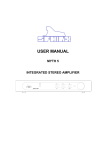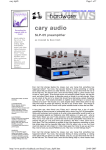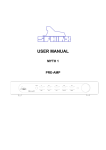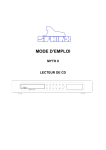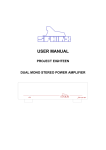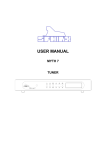Download User Manual
Transcript
1. USER MANUAL PROJECT TWO Mk2 PRE-AMP SPHINX Project Two Mk2 1. UNPACKING .......................................................................................................................................3 2. SPHINX WARRANTY CARD ..............................................................................................................3 3. THE PRE-AMP AT A GLANCE...........................................................................................................4 Front panel................................................................................................................................................... 4 Rear panel ................................................................................................................................................... 5 4. INSTALLATION AND CONNECTIONS ..............................................................................................6 Installation.................................................................................................................................................... 6 Connecting the mains cable ........................................................................................................................ 6 Audio connections ....................................................................................................................................... 6 Connecting the power amp .......................................................................................................................... 6 Balanced.................................................................................................................................................... 6 Unbalanced ............................................................................................................................................... 6 Connecting a recorder ................................................................................................................................. 6 Connecting the inputs .................................................................................................................................. 6 Balanced.................................................................................................................................................... 6 Unbalanced ............................................................................................................................................... 6 Connecting a turntable................................................................................................................................. 6 Balanced.................................................................................................................................................... 6 Unbalanced ............................................................................................................................................... 6 Connecting a CD player............................................................................................................................... 7 Balanced.................................................................................................................................................... 7 Unbalanced ............................................................................................................................................... 7 Connecting a tuner ...................................................................................................................................... 7 Connecting other signal sources ................................................................................................................. 7 Connecting the GROUND wire .................................................................................................................... 7 Connecting the optical cables...................................................................................................................... 7 5. OPERATION........................................................................................................................................8 Power on...................................................................................................................................................... 8 Selecting an input ........................................................................................................................................ 8 Adjusting the volume level ........................................................................................................................... 8 Memory mode .............................................................................................................................................. 8 Power off...................................................................................................................................................... 8 6. SPHINX REMOTE CONTROL ............................................................................................................9 Buttons and LED indication ......................................................................................................................... 9 Operation ................................................................................................................................................... 10 Selecting without switching ........................................................................................................................ 10 Batteries..................................................................................................................................................... 10 Encountering problems.............................................................................................................................. 10 7. CARE AND MAINTENANCE.............................................................................................................11 8. TECHNICAL SPECIFICATIONS .......................................................................................................11 2 SPHINX Congratulations with your purchase of the Sphinx Project Two Mk2! You are now a member of an ever increasing group of quality conscious audiophiles using Sphinx products. We are very proud of the tradition connected with SPHINX name especially concerning audio quality perfection. This manual will help you to gain a maximum amount of pleasure and quality from your new Sphinx Project Two Mk2 Pre-Amp. This pre-amp uses the newest technologies and refined designs and is extremely simple to operate. Designs that succesfully have been used in the award winning Project Eight. Such as the ultra-linear extremely low-noise Class A audio circuits, built from the finest hand-selected parts. The signal path is completely balanced from input to output, and left and right are totally separated. The power supply is of a unique design (fully ClassA!) and consists of three completely separate and independant sections: one for the digital control plus one each for the left and right channel. Input selection is done by means of precision relays. The ALPS volumecontrol is motordriven. All settings and controls can also be done via the supplied Sphinx Remote Control. Project Two Mk2 1. UNPACKING Before leaving the factory every Project Two is subjected to stringent and extensive technical and exterior quality inspections. This ensures you will enjoy many years of high quality audio from a perfect-looking product. After unpacking your Project Two we therefore recommend you carefully check it for any transport damage. In case of damage: please contact your Sphinx dealer immediately and retain all packing materials for possible proof of damage and possible claims. Even if the component is in perfect condition you still should keep the packing materials. If you need to transport your Project Two at a later time it will be best protected by the original packing materials. 2. SPHINX WARRANTY CARD Please take this opportunity to fill out the enclosed warranty card now! Follow the instructions on the card or consult your dealer. Please send the card as soon as possible to the return address (within 14 days after purchase). To obtain the maximum quality from this power amp it is necessary to use it with top quality audio components, preferably with other Sphinx components. Please read this manual carefully before you install or use the Project Two. It is important to familiarise yourself with the special functions, operation and possibilities of the Sphinx Project Two. Your local dealer will be able to answer any questions concerning other Sphinx audio components. 3 SPHINX Project Two Mk2 3. THE PRE-AMP AT A GLANCE Front panel 3 1 2 1. INPUT: With this rotary knob you select one of the six inputs. Turn clockwise for an input to the right of the active one, anti-clockwise for an input to the left. 4 6 7 8 5. MUTE: Press this button to temporarily mute the sound. The red LED will light. 6. TAPE MON: To select the TAPE IN input. The red LED will light. 2. STANDBY: To switch the component on and off: on LED is green off LED is red 7. PHONES: To connect dynamic stereo headphones. 3. Receptor window for the IR signals from the Remote Control. 8. VOLUME: This rotary knob adjusts the volume level. 4. Input selection LED's: The input selected with knob (1.) is indicated by one of these LED's: CD SYM balanced CD input CD unbalanced CD input TUNER Tuner LINE 1 unbalanced line input 1 LINE 2 unbalanced line input 2 LINE 3 unbalanced line input 3. 4 SPHINX Project Two Mk2 Rear panel 9 10 11 12 13 14 15 16 17 18 19 20 21 22 23 24 25 26 27 28 1. GROUND: You may directly connect the signal grounds of other equipment tot the signal ground of the Project Two. 11. BALANCED OUT L: To connect the XLR signal cable (balanced cable) from the left input of the power amp. 2. TAPE OUT: Connect this output to the input of the recorder. 12. BALANCED OUT R: To connect the XLR signal cable (balanced cable) from the right input of the power amp. 3. TAPE IN: Connect this input to the output of the recorder. 4. CD: To connect the cinch signal cable from the CD player. 5. TUNER: To connect the cinch signal cable from the tuner. 6. LINE 1: To connect the cinch signal cable from the signal source for LINE 1. 13. OUT 1 L+R: Connect this output with a cinch signal cable to the input of your power amp. 14. OUT 2 L+R: To connect the XLR signal cable (balanced cable) from the right input of the extra power amp or surround processor. 15. Control Out: To connect the optical cable going to another Sphinx component. 7. LINE 2: To connect the cinch signal cable from the signal source for LINE 2. 16. Warning!: This shows important information about the safety regulations of the Project Two MK2. 8. LINE 3: To connect the cinch signal cable from the signal source for LINE 3. 17. AC Power: Connect the mains cable to a mains power outlet (100 - 240 VAC). 9. CD BALANCED L: To connect the XLR signal cable (balanced cable) from the left output of the CD player. 18. O / I: This is the mains power switch. 10. CD BALANCED R: To connect the XLR signal cable (balanced cable) from the right output of the CD player. 20. Selector for power supply voltage (120/240 V), (115/230 V). 19. Fuse holder: Contains a fuse. 5 SPHINX 4. INSTALLATION AND CONNECTIONS Installation The Project Two will not become very hot so placement is not critical. Although you should not place it on top of or near other heat radiating equipment (such as power amps) or in direct sunlight. If you need to use the pre-amp in a closed cabinet or on a bookshelf you absolutely should provide unrestricted ventilation around the component. To prevent any possible interference keep power supply cables away from all audio cables. If all these conditions are met the Project Two will perform to the extremely high standards it is designed for. Connecting the mains cable Before you connect the cable please check whether the mains voltage indicated on the manufacturers label on the rear panel is the same as your local mains voltage. If not: please contact your dealer and do not connect the component to the mains. You switch the pre-amp on/off with the STANDBY button. This way the electronic circuits will be kept at optimum working temperature so you can enjoy maximum audio quality immediately after switchingon. On top of that it significantly increases the life span of the component. Connect the mains cable after you have connected all other components in the system and have double-checked all connections (see Chapter 5.) Audio connections Before you start connecting equipment it is always wise to check whether all mains power cables of all components are disconnected from the mains outlets! This will prevent any damage to the loudspeakers and amplifiers caused by incorrect wiring or settings. Make sure you connect L and R properly. Most cinch cables use Red for the Right channel and White or Black for Left. All cinch connectors on the Project Two's rear panel have a red centre for the right channel and a white one for the left channel. The XLR connectors are marked RIGHT and LEFT. When making the connections please refer to the descriptions for parts 9. up to 28. on page 5. Project Two Mk2 Connecting the power amp There are three outputs: OUT 1, OUT 2 (unbalanced cinch) and Balanced Out (balanced XLR). All three can be used simultaneously. Balanced Use a balanced XLR cable to connect BALANCED OUT L en R to the corresponding inputs of the power amp. Unbalanced Use a normal cinch cable (but of the best quality!) to connect OUT 1 to the corresponding inputs of the power amp. Use a normal cinch cable to connect OUT 2 to the corresponding inputs of another component such as an extra power amp or surround processor. Connecting a recorder Connect the recorder's inputs to the TAPE OUT outputs. Connect the recorder's outputs to TAPE IN. Connecting the inputs There are five unbalanced inputs and one balanced input. Balanced Use CD BALANCED to connect the balanced outputs of a CD player. You may connect any signal source to any input. Unbalanced The unbalanced inputs may be used for any unbalanced line level signal. Connecting a turntable There is no specific RIAA phono-input. When using a turntable you should pre-amplify the signal with a separate phono pre-amp (or pre-pre-amp). The turntable may be connected in two ways. Balanced Connect the balanced output of a phono pre-amp to CD BALANCED (for example). Unbalanced Connect the unbalanced output of a phono pre-amp to one of the cinch inputs LINE 1 to LINE 3. You may connect the phono pre-amp balanced and unbalanced simultaneously! Or you may use two different pre-amps. 6 SPHINX Project Two Mk2 Connecting a CD player Connecting the optical cables The CD player may be connected in two ways. The Project Two has a CONTROL OUT optical connector so it can remotely switch other Sphinx components to stand-by. Balanced Connect the balanced output of a CD player to CD BALANCED. Unbalanced Connect the unbalanced output of a CD player to CD. You may connect the CD player balanced and unbalanced simultaneously! Or you may use two different CD players. Connecting a tuner Connect the unbalanced output of a tuner to TUNER. If applicable you may connect the tuner's balanced outputs to CD BALANCED (if not in use by another component)! When the CONTROL IN of a component is connected to the CONTROL OUT of the Project Two with an optical cable you do not have to use that component's ON/OFF switch. As soon as the Project Two is selected to stand-by the other component is also selected to stand-by. CONTROL OUT: This output is activated as soon as the Project Two is switched. Ensure proper connection of the optical cables (from CONTROL OUT to CONTROL IN), otherwise the LED next to the STANDBY button (2.) on the front panel may remain green although the stand-by mode is activated. Connecting other signal sources LINE 1 to LINE 3 are available for other signal sources. Connecting the GROUND wire You may directly connect the signal ground of other equipment to the Project Two. This may be necessary to obtain the maximum S/N-ratio and the lowest hum level. You have to experiment with the ground connections to get the optimum method for each piece of equipment. 7 SPHINX 5. OPERATION Connect the mains cable to a mains outlet. After you have finished connecting all components, you can power on the Project Two with the mains switch O / I (26.). The volume control will then automatically turn counter-clockwise and during a certain period the STANDBY LED will blink red/green after which it will remain red. The preamp is now in standby mode. From now on you only switch the amp on/off with the STANDBY button. That way all circuits will remain at optimum operating temperatures and the audio quality will be at 100% immediately after switching on. On top of that it significantly increases the life span of the component. The Project Two is now in stand-by mode. Power on You switch the Project Two on with the STANDBY button. The preamp will select the CD SYM input after which it un-mutes the output. Project Two Mk2 Selecting an input You select the input with the large rotary knob INPUT: clockwise to the right of the selected one, anti-clockwise to the left of the selected one. Upon reaching LINE 3 or CD SYM you can't 'roll over' to CD SYM of LINE 3 respectively. As long as you move the knob only the LED's will change: the current selected input remains active. The new input only becomes active after you have selected it and release the INPUT knob. You will hear a 'click'. This is caused by the precision relays for the inputs: the 'old' one is released while the new one is energised. Adjusting the volume level The large VOLUME control to the right adjusts the volume level from OFF to maximum (fully clockwise). The level change is immediate. Memory mode The Project Two has a MEMORY mode: it automatically selects the last input that was active before you switched the component off with the stand-by button. Power off You switch the Project Two off (to stand-by) with the STANDBY button (2.). 8 SPHINX Project Two Mk2 6. SPHINX REMOTE CONTROL This single Sphinx Remote Control lets you control all functions: not only of the Project Two, but of all other Sphinx equipment. Only the following buttons and indications of the Remote apply to the Project Two (the others will not function): Buttons and LED indication 1. 2. 3. 4. 5. 6. 7. PRE-AMP: To select the amp. All buttons pressed hereafter will only control the amp functions. The buttons TUNER and CD will have no effect on the amp. STANDBY: Use this red button to switch the Project Two to stand-by. : Pressing this green button mutes the outputs (temporarily) and you will not hear any sound. The red LED will be illuminated. Another press on this button un-mutes the outputs. TAPE/MONITOR: Use this button to select the Tape IN input. Pressing this button has the same effect as pressing the TAPE button on the front panel. Note: The LED of the selected input (see 5.) will remain illuminated. 1 - 6: To select inputs CD SYM to LINE 3 (Note: 7 to 0 do not function): 1 CD SYM balanced CD input 2 CD unbalanced CD input 3 TUNER Tuner 4 LINE 1 unbalanced line input 1 5 LINE 2 unbalanced line input 2 6 LINE 3 unbalanced line input 3 ñ button: Pressing this button has the same effect as clockwise rotating the VOLUME control on the front panel. You will increase the volume. ò button: Pressing this button has the same effect as anti-clockwise rotating the VOLUME control on the front panel. You will decrease the volume. 9 SPHINX Operation The Sphinx Remote is used for several different models and can therefore transmit different control codes, depending on which model has been selected with the select buttons (1.). Important: Always press the PRE-AMP button before you send a command (even if you only have one Sphinx component). Otherwise it is possible that, although the Remote sends a signal (LED blinks), nothing happens because the transmitted signal is not 'recognised' by the component. Indoors the Remote may be used up to a distance of 7 meter, provided there is no strong sunlight in the room and if you aim the Remote at the component. Always aim the Remote straight at the front panel of the component, the maximum offset angle is 30°. Project Two Mk2 Encountering problems... Remote Control does not work Wrong component selected Select the correct one Distance to component exceeds 7 m Use Remote at closer range Angle between Remote and component exceeds ±30° Decrease angle Sensor window on front dirty Clean window Batteries empty or incorrectly placed use new batteries or replace the old correctly Strong (sun)light in room Shade off Component is not switched on (!) Switch it on Selecting without switching Suppose for instance that you would like to select the Tuner to Radio 4 without interrupting the CD playback. In that case you momentarily depress (not longer than 0.5 sec) the 'TUNER' button and the '4' button. The same procedure is used for the other system components. How to operate the Remote Control with the different Sphinx components will be explained in the corresponding User Manual of each component. Component reacts differently than expected or not at all Wrong component selected Select the correct one Component or Remote does not function Check component with it's original remote Batteries of remote empty Use new batteries Batteries The four batteries have a life span of approx. one year during normal use, but shorter when used more intensely. Replacement batteries: 1.5 V, model micro or penlite or LR03 or AAA or AM4 (one of these codes is indicated on the packaging and the batteries). You may also use rechargeable 1.5 V batteries. Note: Position the new batteries exactly as shown in the illustration at the bottom of the battery compartment, otherwise the Remote will not function! 10 SPHINX Project Two Mk2 7. CARE AND MAINTENANCE Do not use polishing or cleaning agents: they may damage the sensitive acrylic finish. Clean the exterior with a soft, lint-free, anti-static cloth. Do not use force while wiping the surface. To remove difficult stains use a few drops of detergent on a moist cloth, sweep carefully and wipe dry afterwards. Do not use aerosol cleaning agents. Most contain solvents which might actively react and damage the acrylic finish. If some scratching occurs, please first consult your Sphinx dealer. He can give you advice about possible solutions. 8. TECHNICAL SPECIFICATIONS Bandwidth Phase response error Gain THD+N (IHF-A) IMD S/N ratio (IHF-A) Channel separation 0 - 500,000 Hz (+0/-3 dB) <0.5° 18 dB max. <0.0015% (2nd harm., 10 - 20,000 Hz) <0.003% >100 dB >100 dB Inputs 1 x XLR balanced 5 x cinch unbalanced (goldplated) 0.13 V (-18 dBV) XLR: 10 kΩ / cinch: 50 kΩ level, nominal (for 1 V output) impedance Outputs level impedance 1 x XLR balanced 2 x cinch unbalanced (goldplated) 1 x cinch Tape (goldplated) 9.2 V max. (19.3 dBV) (1 - 100,000 Hz, THD <0.002%) <10 Ω Volume control channel imbalance ALPS motorized less than 2 dB Sphinx Control 1 x optical Remote control Full function Mechanical decoupling of housing Transrotor absorbing 'pucks' Power supply Supply capacitance Power consumption External, completely stabilized 35,200 µF total 15 W stand-by 17.5 W 'on' 68 x 482 x 328 mm 11 kg Dimensions (h x w x d) Weight This unit conforms to the EMC interference regulations from the EU and to the CE standards. This unit complies with safety regulation VDE 0860 and thus with international safety regulation IEC 65. Technical specifications can be changed by SPHINX without prior notice if technical developments make this necessary. ©1999 Audioscript BV 11












